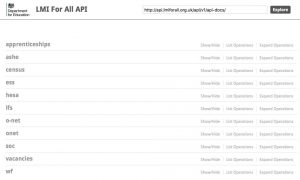CareerHack: What is LMI for All and how can I use it?

This guide was originally written for the LMI for All CareerHack contest held in 2014. Since then we have been told that it is a useful introduction to LMI for All especially for those developing applications and so we have produced this updated version.
The guide is intended to walk you through LMI for All, what the API means and how to use it – you’ll be on your way to submitting your entry in no time! Happy hacking!
Every year in the UK a huge amount of high quality information is gathered about the UK labour market that could be used to help people make better decisions about their careers. Although this information is freely available, it is often not easy to access or understand.
The aim of LMI for All is to bring this data together in one place, making it available as an API to developers, app makers and web designers at no cost, so that they can incorporate it into websites and applications, providing high quality up-to-date information for their users.
Not sure of how you could use our data? This guide is designed to show you the extent of the information available, and how you could make use of it. It also provides links to the documentation, syntax, support and some examples of how the data has been used so far.
The Data
The LMI for All data tool includes information that can answer some of the most common questions asked when people are thinking about their careers, from how much a certain job pays to the kind of people who typically do a certain job and their qualifications. You can also make comparisons across different jobs and regions.
Contextual data
To support the organising framework of the LMI for All database contextual data is included:
- Occupational descriptions from the ONS Standard Occupational Classification provide the organising strucutre for the database, description of occupational roles and common tasks associated with the roles.
- Skills, Knowledge, Abilities and Interests from the US O*NET system mapped to UK Standard Occupational Classification provides detailed data on the skills, abilities and interests associated with particular occupations. The data are taken from the well-respected US O*NET system. They are tied to the UK occupational categories by a mapping that links each UK occupation with one or more US occupations.
Main datasets included in LMI for All
The current version of the LMI for All database contains the following key datasets:
- Employment (past, current and future) and replacement demands from Working Futures: Provides very detailed information on job opportunities, covering a range of dimensions including occupation, industry, UK country /region, gender and employment status. As well as reporting actual historical employment levels this also includes projected future employment levels to 2024. It also includes estimates of Replacement Demand, which is a measure of job openings likely to arise over a selected period because of people who are currently employed retiring or leaving for other reasons.
- Pay and earnings based on the Annual Survey of Hours and Earnings (ASHE) and the Labour Force Survey (LFS): Provides the same level of detail on pay but does not include any projections.
- Hours based on ASHE: Provides a similar level of detail for hours as for pay.
- Unemployment rates from the LFS: Provides information on Unemployment rates. In principle a similar level of detail is provided as for pay (again excluding any projections). However, small sample sizes mean that many of the more detailed results cannot be generated or published.
- Vacancies (incidence and causes) from the Employer Skill Survey: Provides information on vacancies. At present this is based on the Employer Skills Survey and focuses on skills shortage vacancies.
- Geographic patterns of employment from the Census of Population provides information on geographical patterns of employment and travel to work distances.
- Current vacancies available from the Department for Work and Pensions ‘Find a job’ API provides access to live vacancies.
- Higher education destinations data from the Higher Education Statistical Agency (HESA) provides information on occupational destination of graduates.
In practice some of the details in these datasets and elsewhere may need to be suppressed because of concerns about privacy, disclosure of commercially sensitive information and lack of statistical robustness. Details of this are given in the description of the individual datasets.
Syntax – easy as ABC
What information can I get?
The API is called by your program. Each call to the API has different parameters and different results dependent on the data that is required. A full list can be seen in the LMI for All API Explorer. Try it!
Want to get information on Standard Occupational Classification (SOC) Codes? Easy! Go to the LMI for All API Explorer and on the screen shown click on the link for /SOC:

Open up /soc/search as shown above and then type in ‘retail’ in the parameter and then hit “Try it Out”.
This shows you the URL that you would embed in your code and also it shows the response that you would get.
Explore all the data
There are many different calls to the API that can be made, but the way to get them is just the same as you did for the SOC code. Try out the various options and see the wealth of data that is available. All of the different calls including, descriptions, are included in the API.
Still need a bit of hand?
Don’t worry – there are plenty of web apps out there that will help you create an app from scratch – and you don’t need to know any coding to get started! While these won’t be perfect for everyone, and may be a bit restricting in terms of what they allow you to do, they will certainly get you off the ground, and can show you just how easy it is to end up with a slick looking app from nothing. There’s plenty to choose from, but here are some examples: GoodBarber; AppyPie; BuzzTouch; and Apps Builder.
Example sites
For some more examples of websites and app, which have already used the LMI for All API, why not have a look at our directory and the 2013 CareerHack winners for some inspiration. You can also view a video demo of a website utilising the LMI for All API here.
Support
If you have any problems do get in contact, but there is also a developer community forum where you can post questions. In addition to this, you can also tweet; find us on twitter @LMIforAll.
